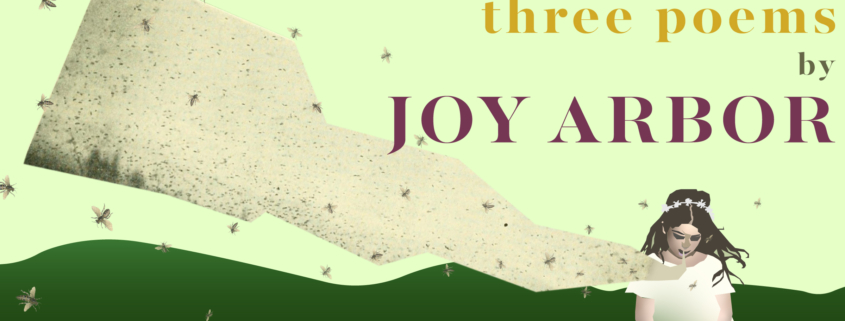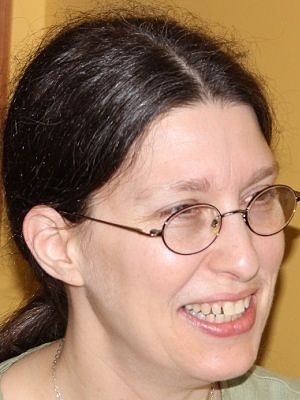The Shekhinah, The Key to the Cinema, & The Very Breath of Children Is Free of Sin
The Shekhinah
Some say the Shekhinah is the queen
of presence, pulsing upward through
the living earth, bidding us to bloom
in our skins. The apple orchard
in full blossom. But when you see me,
I am a burning flame,
blonde hair billowing behind.
You have no throne festooned with ribbons,
no needle to embroider my plastic chair,
no silks to shimmer with my light.
I am an environmentalist drinking
from a Styrofoam cup. In cafes, I am silent,
can’t chat about good coffee and bad men. In the sukkah
sleeping under the eyes of myrtle, I dreamt I
was walking in Umm Batin and from under the main street
Hebron’s sewage rose till I was wading,
waste on my face, slogging until I got to a tent
to sip thick coffee and smoke a negilah, a minyan
of black-clad men in a corner bobbing. No
sewage here. It settled back into the earth.
I awoke shivering, sick under the patchy sky,
choking on ashes. I longed to tell my friends,
to dwell in the tabernacle of fellow feeling,
to harvest some compassion, to share
how our eyes always on Jerusalem blinds us to the stranger
who also dwells here, who doesn’t need the sukkah
to know everything is connected—new settlement
bathrooms, sewage leaching into the soil, meat, and cheese.
Next year in Jerusalem the chance of a Bedouin
getting cancer up 60 percent. I opened my mouth
but bees flew out, buzzing about a village girl
molested by her brother. Silence heavy in the sukkah.
In Wadi el-Naam, the health clinic I built to help
sits on a toxic waste dump. I ring out the last drops
of my strength in that village. I now pay to protect
the solar panels. My partner
accuses me of getting kickbacks from doctors.
This land holds magic and poison,
everything that sustains, every toxin.
It gets into your blood. I burn
to be part of the tribe, harvest rainwater,
farm like Ruth and Naomi, tend grapes and olives
without grabbing from those who have so little left.
How can you break bread around the Shabbat
table with those who don’t care?
So I live in a flat in Tel Aviv
no earth between my fingers, no growth to tend,
gates to God closed. My land, my heart
cordoned off with eight meters of concrete
and spirals of wire. The Wall
where papers are checked
and compassion halts.
In Hebrew, the word for person
is adam; adama, soil, has the same root.
I want this place
to feel like home.
The Key to the Cinema
My psych of genocide
prof invited me to a Friends
of Palestine meeting.
There each spoke around the circle
of their connection with Palestine.
A woman showed an old
photo, opened a box
on the mantel, took out
a key. Outside Jaffa
Gate was my house.
It’s a cinema now.
Her son said he’d never
been home.
A long
walk and there it is—
the Cinematheque. Not
the same walls—abandoned,
demolished—maybe what Mahmoud
meant when he said a house
dies without its owner. So
when the dead or dreaming visit,
they see old rooms;
the children’s ghosts chase
each other with a toad when no one’s
around like the day I wandered through
(why open yet empty?), red
ropes holding nothing back,
and from theatre four I heard
Grandma’s soft snore
as she took her rest before suppertime.
The Very Breath of Children Is Free of Sin
from a short passage in Raja Shehadeh’s Strangers in the House
As children were walking home from school
men kidnapped a boy
walking home from school
and shot randomly into the crowd of boys
walking home from school
who ran to the hills for cover.
Children were walking home from school
but one boy had not returned. His mother went
to the prison where she was told her son was kept
she was afraid he was cold and brought a sweater
to the prison where she was told her son was kept;
the prison guard took it from her
at the prison where she was told her son was kept
and promised to hand it to him
inside the prison where she was told her son was kept.
Aching, three days. She waited, yet
the boy was not released
from the prison where she was told her son was kept;
a shepherd found the boy
dead above the village
killed by one of the men’s bullets
walking home from school.


 The granddaughter of a captain in Israel’s War for Independence, Joy Arbor grew up in Los Angeles, CA, listening to his stories of the Israeli-Palestinian conflict. To listen to other points of view, she joined the Compassionate Listening Project’s citizen delegation to Israel and the West Bank. Poems about her experiences have appeared in Crab Orchard Review, Scoundrel Time, and Scintilla. She is also the author of the chapbook, Where Are You From, Originally? (Finishing Line Press, 2016). She lives with her husband and son in Michigan’s Thumb and blogs occasionally about genocide and racism at
The granddaughter of a captain in Israel’s War for Independence, Joy Arbor grew up in Los Angeles, CA, listening to his stories of the Israeli-Palestinian conflict. To listen to other points of view, she joined the Compassionate Listening Project’s citizen delegation to Israel and the West Bank. Poems about her experiences have appeared in Crab Orchard Review, Scoundrel Time, and Scintilla. She is also the author of the chapbook, Where Are You From, Originally? (Finishing Line Press, 2016). She lives with her husband and son in Michigan’s Thumb and blogs occasionally about genocide and racism at 


